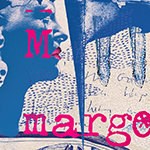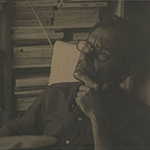The Taste of White Chocolate With Flecks of Freeze-Dried Strawberries
About loss, relief, days filled with mysteries
and the taste of black sesame.
I mark sashiko in watercolour, whichever way the stitch goes.
Against the pale cotton background. In the recesses of summer nights.
I live in the distance, I live with my defeat, quietly, limiting sugar,
white flour, all kinds of fools.
And you?
You talk about daphnia, threads rippling just above the water,
the penetrating green which begets mould, a raid coming from the ocean,
waning ground picked up by waves, stones appearing out of nowhere.
Wild beaches with no path, no seam.
We go through cycles, we pass each other in collections, between letters.
And you say you dreamed it all, the west coast
the taste of smoked fish, the oyster festival hidden behind paper masks.
Speculations
for my son
I’m on a bus to pick up my son,
in the past I had no son, no whaling dreams
no evening dress. I didn’t need any memories
to write until things turned black or faded in the sun.
I didn’t have to disguise myself to be open about gender
and submarines. About nuclear explosions
at the bottom of the ocean. Summer is turning pale. In the folds of books
sand is crunching, ginkgo leaves are going dry. A living fossil
shimmers between the tree branches pierced by an arrow. As well as the smell
of hot springs, I do not recognise muffled voices.
I get out soundlessly, I curse the day.
Maybe I’ll try to make some Irish stew.
Butter the pretzels, top up the water in the coffeemaker.
In the evening we drink wine, someone says they know me well.
Read between the lines. Rack their brains, tell jokes
try gestures, retrieve, do some tricks.
Translator’s Note:
I’ve been following Margo Południak’s creative journey for a long while now. She is a very talented poet, but also a visual artist, photographer, graphic designer, and book designer. Simply speaking, whatever she touches, she turns into gold.
We met online, through a mutual Facebook friend, and remained in contact for years, but last year marked a rather special moment when we finally met in person. It was one of those meetings when you feel like everything immediately clicks into place, as if you’ve known the person forever.
Reading Margo’s poetry gives me a similar feeling: of quiet recognition, of looking in the mirror, of the “a-ha!” moment. Translating her poems only amplifies this feeling further. What I also love about the process is the fact that Margo, who has lived in Ireland for a good few years now, speaks very good English herself, so while discussing translation solutions and ideas, we can go quite deep into the conversation. In the end it’s always about weighing the options, carefully choosing the right term or phrase, looking at the syntax and deciding whether it hits the mark or not. If the translator and the author can discuss it on equal terms, it makes the whole translation process pure magic. Translating Margo’s poems was that for me.

Małgorzata (Margo) Południak is a poet, graphic designer, book designer, photographer, and artist. Since 2012, she has lived in Ireland, but she writes in Polish. She was nominated for several poetry prizes in Poland, and is widely published in literary magazines. So far, she has published six poetry collections, the most recent one being Pierwszy milion nocy (The First Million Night, FONT, 2024). She has also taken part in numerous exhibitions of photography, graphics, and typography.

Anna Blasiak is a poet, translator, and managing editor of the European Literature Network (ELN). She has translated over 50 books from English into Polish, and some fiction and poetry from Polish into English. She has published two bilingual poetry and photography books (with Lisa Kalloo), most recently Deliverance / Rozpętanie, as well as the book-length interview Lili. Lili Stern-Pohlmann in conversation in Anna Blasiak. She regularly reviews books in translation for the ELN, where she also runs a monthly poetry column “Poetry Travels,” and a blog devoted to Polish literature, “The Polka.” She is one of the editors of Babiniec Literacki. annablasiak.com. Photo by Lisa Kalloo.

 BACK TO ISSUE
BACK TO ISSUE
